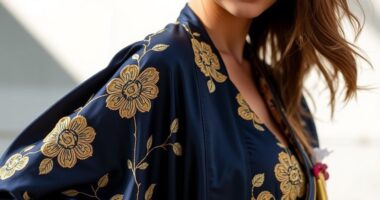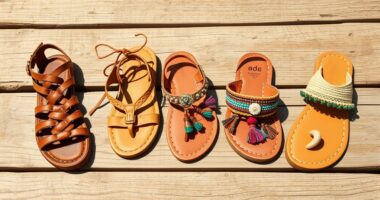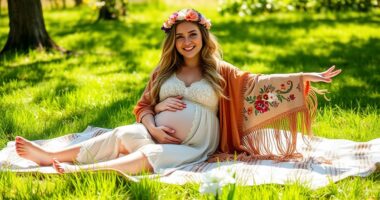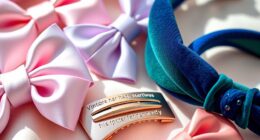Discover sustainable boho fashion by choosing eco-friendly fabrics like organic cotton, linen, hemp, and Tencel, which are biodegradable and sustainable. Support ethical brands with transparent supply chains and certifications such as GOTS and Fair Trade that prioritize fair wages and eco-responsibility. Incorporate vintage and upcycled pieces for unique style and waste reduction. Focusing on timeless designs from brands like Reformation or Patagonia helps create a conscious wardrobe. Keep exploring for more tips on building your eco-chic boho look.
Key Takeaways
- Natural fabrics like organic cotton, linen, hemp, bamboo, and Tencel are eco-friendly choices for sustainable boho wardrobes.
- Supporting ethical brands with certifications such as GOTS, Fair Trade, and B Corp ensures responsible sourcing and fair labor practices.
- Embrace vintage, upcycled, and thrifted pieces to reduce waste and promote circular fashion in your boho style.
- Invest in timeless, durable pieces made from sustainable fabrics to build a long-lasting, eco-conscious wardrobe.
- Future-proof your style by choosing eco-friendly textiles and brands committed to transparency and sustainable manufacturing practices.
Embrace Natural and Organic Fabrics for Your Boho Wardrobe
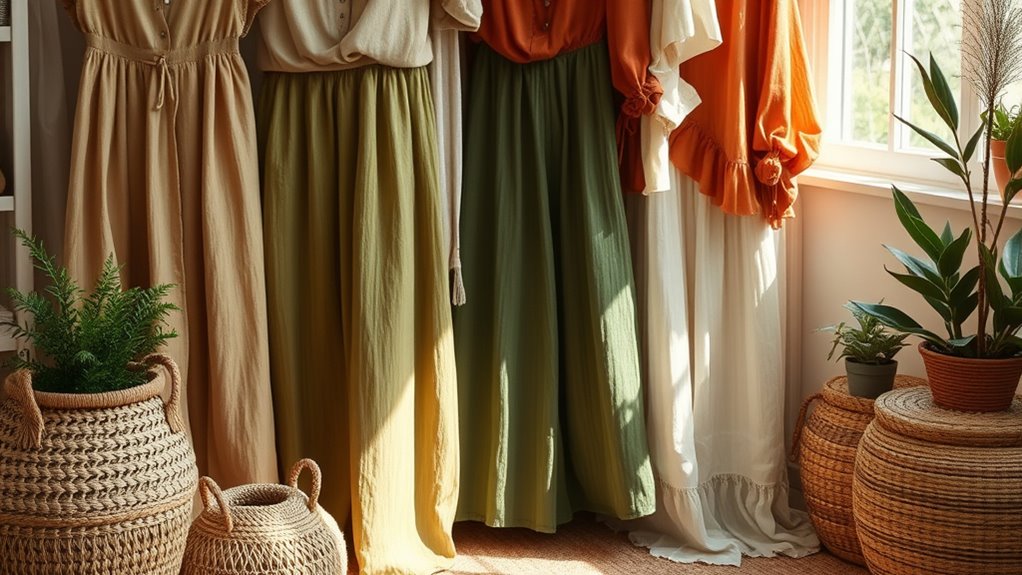
To build a sustainable boho wardrobe, embracing natural and organic fabrics is essential. Organic fabrics like organic cotton, linen, hemp, bamboo, and Tencel are eco-friendly clothing choices that require fewer resources and are biodegradable. Organic cotton is grown without synthetic pesticides or fertilizers, supporting soil health and reducing chemical exposure. Linen made from flax plants needs less water and fewer pesticides than cotton, making it perfect for warm-weather styles. Hemp is incredibly sustainable, demanding minimal water and no pesticides, while growing rapidly. Bamboo fabric, when processed responsibly, is biodegradable, moisture-wicking, and fast-growing, offering another eco-friendly option. Choosing natural fabrics supports ethical brands committed to sustainable materials, helping you create a stylish, environmentally conscious boho wardrobe. Additionally, selecting fabrics with minimal chemical treatments helps reduce environmental impact and supports overall sustainable fashion practices. Incorporating eco-friendly textiles into your wardrobe not only benefits the environment but also encourages responsible consumption and mindful fashion choices. Understanding the environmental benefits of natural fabrics can further motivate your sustainable fashion journey and contribute to cultural intelligence by fostering awareness of diverse sustainable practices worldwide.
Discover Ethical and Eco-Conscious Brands That Prioritize Sustainability

When you choose brands with transparent supply chains and Fair Trade certification, you’re supporting ethical practices and fair wages. These companies prioritize eco-friendly manufacturing and use recycled or natural materials to reduce environmental impact. By focusing on such brands, you can build a sustainable boho wardrobe that aligns with your values. Incorporating ethical sourcing and sustainable production methods ensures your fashion choices contribute positively to both the environment and the communities involved. Additionally, selecting brands that implement sustainable manufacturing practices helps minimize pollution and waste. Embracing positive thinking can also inspire more mindful and intentional purchasing decisions, reinforcing your commitment to sustainability. Moreover, understanding how creative practice can foster innovative solutions encourages brands to adopt even more effective eco-friendly strategies. Recognizing the importance of practical support can empower consumers to make more informed and responsible fashion choices.
Transparent Supply Chains
Transparent supply chains are essential for identifying brands that genuinely prioritize sustainability and ethical practices. When brands embrace supply chain transparency, they openly share sourcing information, factory conditions, and manufacturing processes. This openness helps you verify their commitment to ethical manufacturing, fair trade, and the use of sustainable fabrics. Certifications like GOTS, Fair Trade, and B Corp serve as trusted indicators, confirming responsible production. Brands that disclose sourcing locations and production details demonstrate accountability, allowing you to make informed, eco-conscious choices. Increasingly, eco-friendly brands are adopting traceability initiatives, making it easy to trace garments from farm to finished product. By supporting brands with transparent supply chains, you promote fair wages, safe working environments, and environmentally responsible materials, aligning your fashion choices with your values. Additionally, automation in business contributes to more efficient and transparent supply chain management, ensuring better oversight of ethical practices. Implementing blockchain technology can further enhance traceability by providing immutable records of each step in the production process. Advances in digital tracking systems also facilitate real-time monitoring of supply chain activities, reinforcing accountability. Embracing supply chain transparency not only benefits consumers but also encourages brands to uphold higher standards throughout their operations. Incorporating sustainable manufacturing techniques further supports environmental and social responsibility in fashion.
Fair Trade Certification
Ever wondered how to guarantee your fashion choices support fairness and sustainability? Fair Trade Certification helps you do just that. It ensures brands follow strict standards for ethical sourcing, providing fair wages and safe working conditions for artisans and workers. Brands with this certification prioritize environmentally sustainable practices, like reducing water use, cutting chemical inputs, and using eco-friendly materials. They undergo rigorous audits to maintain transparency and uphold a responsible supply chain from start to finish. Supporting Fair Trade Certified brands empowers marginalized communities, promotes gender equality, and contributes to sustainable development in garment regions. When you choose these brands, you’re investing in ethical production, knowing their sourcing and manufacturing processes are open and accountable, aligning your fashion choices with your values. Embracing eco-friendly fabrics and brands that prioritize sustainable practices further amplifies your positive impact on the environment and global communities. Additionally, many of these brands incorporate certified eco-friendly fabrics, reducing their overall ecological footprint and promoting healthier ecosystems. Incorporating ethical sourcing into your wardrobe can inspire broader change within the fashion industry by encouraging more sustainable and responsible practices. Moreover, understanding the importance of personality test insights can help consumers select brands that align with their personal values and self-awareness. Furthermore, selecting brands that use recycled materials supports circular economy efforts, minimizing waste and conserving natural resources.
Ethical Manufacturing Practices
Choosing brands with Fair Trade Certification already shows your commitment to ethical sourcing, but understanding their manufacturing practices reveals even more about their sustainability efforts. Ethical manufacturing means ensuring fair wages, safe working conditions, and transparent supply chains. When brands prioritize transparent sourcing, you can verify that every step supports social responsibility and environmental care. Certification labels like Fair Trade, GOTS, and B Corp signal adherence to high standards, guaranteeing ethical manufacturing and sustainable practices. Many eco-conscious brands also utilize GOTS-certified organic fibers and low-impact dyes, reducing environmental harm during production. Supporting these brands means empowering local artisans, promoting community development, and ensuring fair treatment for workers. Additionally, adhering to sustainable manufacturing practices minimizes waste and pollution, further enhancing environmental benefits. Incorporating eco-friendly fabrics into your wardrobe helps reduce the overall carbon footprint of fashion production. By choosing ethically manufactured boho pieces, you contribute to a more sustainable and just fashion industry. Recognizing sustainable textile production methods can also lead you to brands that prioritize innovative solutions for reducing water and energy usage. Moreover, understanding the safety features of the manufacturing process ensures that workers are protected and that production adheres to health standards, reinforcing ethical commitments. Emphasizing transparent supply chains allows consumers to make informed decisions and support brands that uphold integrity from start to finish.
Incorporate Upcycled and Vintage Pieces for Unique Style and Reduced Waste
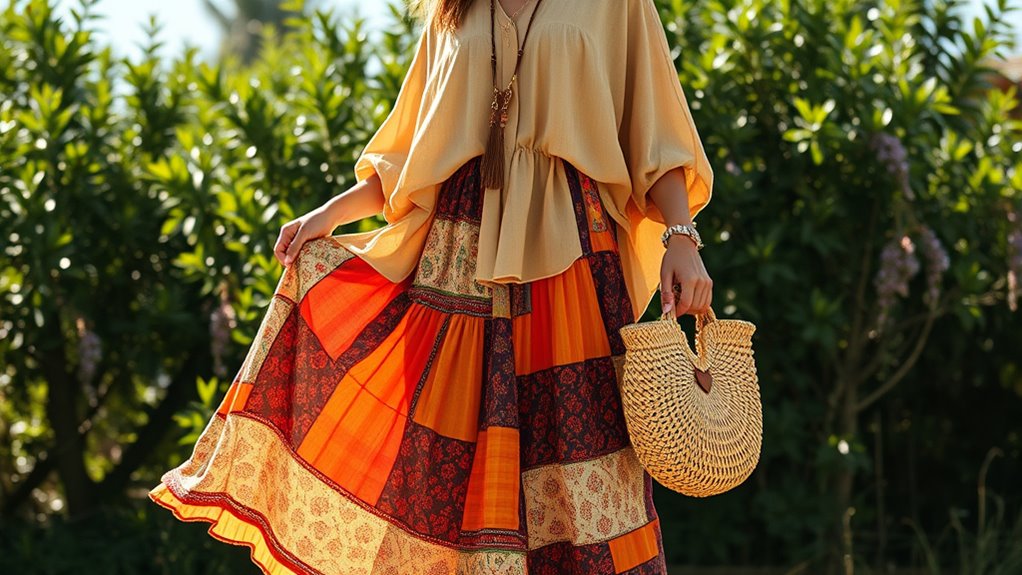
Incorporating vintage and upcycled pieces helps you stand out with one-of-a-kind styles that showcase craftsmanship and history. By exploring platforms like Depop or Etsy, you can find affordable, sustainable fashion that reduces waste and supports circular design. Adding these items to your wardrobe not only expresses your unique taste but also minimizes your environmental footprint. Embracing lifecycle management and continuous learning about sustainable fashion trends can further enhance your eco-friendly wardrobe choices. Staying informed about sustainable materials can help you make more conscious and environmentally responsible fashion decisions.
Unique Vintage Finds
Discovering unique vintage and upcycled boho pieces allows you to stand out with one-of-a-kind styles while actively reducing textile waste. Vintage boho clothing often features intricate craftsmanship and details hard to find in mass-produced fashion, giving your wardrobe a distinctive edge. By choosing upcycled clothing, you’re extending the life of existing fabrics and supporting eco-friendly fashion practices. Platforms like Depop, Poshmark, and Etsy make it easy to find second-hand fashion that aligns with your sustainability goals. These options are usually more affordable, helping you build a sustainable wardrobe without breaking the bank. Incorporating vintage and upcycled pieces not only adds individuality but also promotes a circular economy, minimizing environmental impact while embracing your unique boho style.
Creative Upcycling Ideas
Ever thought about transforming your vintage boho pieces into entirely new accessories or garments? Upcycling offers a creative way to extend the life of vintage fabrics while expressing your personalized style. Here are some ideas to get started:
- Use artisanal techniques like embroidery or dyeing to refresh old fabrics, giving them a modern touch.
- Convert a vintage dress into a patchwork bag, blending sustainability with unique craftsmanship.
- Turn worn-out boho skirts into headbands or jewelry for a personalized accessory.
- Combine multiple vintage pieces into layered, eclectic outfits that showcase sustainable practices.
Sustainable Thrift Shopping
Sustainable thrift shopping offers a stylish way to build a unique boho wardrobe while reducing environmental impact. By exploring second-hand platforms like Depop, Poshmark, and Etsy, you extend the life of vintage pieces and cut textile waste. Vintage boho garments often showcase intricate craftsmanship and rare fabrics, giving you a one-of-a-kind look that supports sustainable fashion practices. Upcycling existing clothing into fresh styles minimizes environmental harm by decreasing the demand for new production and reducing landfill contributions. Thrift shopping also makes high-quality, timeless staples—such as crochet tops, suede jackets, and embroidered dresses—more accessible and affordable. Choosing pre-loved or upcycled items encourages a circular fashion economy, fostering resourcefulness and decreasing reliance on fast fashion, making your wardrobe both eco-friendly and uniquely expressive.
Support Fair Trade and Transparent Supply Chains to Ensure Ethical Practices

Supporting fair trade and transparent supply chains is essential to ensuring ethical practices in fashion. When you choose brands committed to fair trade, you support fair wages and safe working conditions. Transparent supply chains allow you to verify sourcing details and manufacturing processes, promoting trust and accountability. To make informed choices, look for these indicators:
- Fair Trade certification confirming fair wages and ethical labor.
- Transparent supply chains sharing sourcing and production info.
- GOTS certification ensuring organic fabrics and eco-friendly manufacturing.
- B Corp status demonstrating high social and environmental standards.
Invest in Timeless Styles That Stand the Test of Trends and Time

Choosing timeless styles over fleeting trends not only enhances your wardrobe’s versatility but also reinforces your commitment to eco-conscious living. Investing in classic pieces like maxi dresses, wide-legged pants, and simple accessories ensures they remain stylish for years, supporting slow fashion principles. Focus on sustainable fabrics such as organic cotton, linen, and hemp, which develop a beautiful patina and become more durable over time. Neutral tones and subtle prints offer versatile options that can be styled differently across seasons and occasions. Building a capsule wardrobe with these enduring pieces promotes mindful consumption, reduces unnecessary waste, and minimizes environmental impact. By prioritizing well-made, timeless styles, you create a sustainable wardrobe that aligns with your eco-conscious lifestyle while resisting the fast-paced nature of seasonal trends.
Highlight Notable Sustainable Bohemian Brands Making a Difference
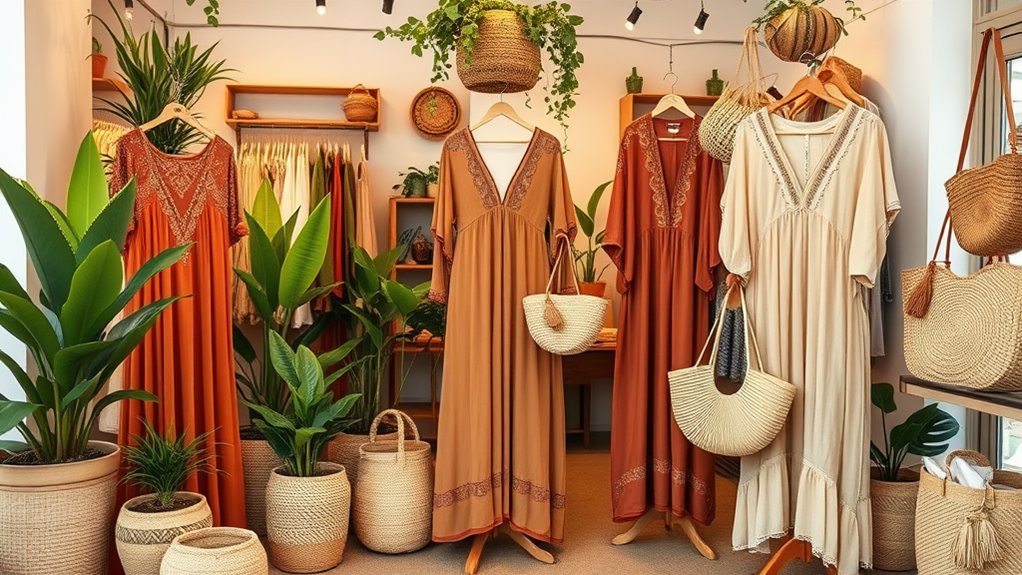
Many bohemian brands are making a meaningful impact by prioritizing eco-friendly materials and ethical practices. These sustainable brands focus on using eco-friendly fabrics like organic cotton, hemp, and recycled materials to lessen environmental harm. Here are four notable examples:
- Reformation, Amour Vert, and Spell & The Gypsy lead in boho fashion with transparent supply chains and certifications like GOTS, B Corp, and Fair Trade.
- Patagonia and People Tree adopt slow fashion, creating versatile, timeless pieces that reduce waste.
- Australian brands Arnhem Clothing and Bali’s Tulle & Batiste emphasize local, eco-conscious production with regenerated fibers and eco-friendly dyes.
- Many of these brands support social initiatives, ensuring fair wages and artisan craftsmanship, truly making a difference in ethical production.
Explore Major Eco-Friendly Labels Leading the Sustainable Fashion Movement

Have you ever wondered which eco-friendly labels are at the forefront of the sustainable fashion movement? Brands like Reformation and Patagonia lead the charge by using fabrics such as organic cotton and recycled polyester, emphasizing low-impact production. Ethical brands like People Tree and Amour Vert hold certifications like Fair Trade, GOTS, and B Corp, ensuring transparent, fair labor practices. Many of these labels embrace slow fashion by producing high-quality, timeless pieces in small batches, reducing waste. They also prioritize eco-conscious dyeing techniques, eco-friendly packaging, and local manufacturing to lower their carbon footprint. These brands often support social initiatives, like planting trees or aiding artisan communities, aligning environmental sustainability with social responsibility. They’re shaping a future where fashion is both stylish and sustainable.
Find Unique and Ethical Brands That Cater to the Boho Lifestyle
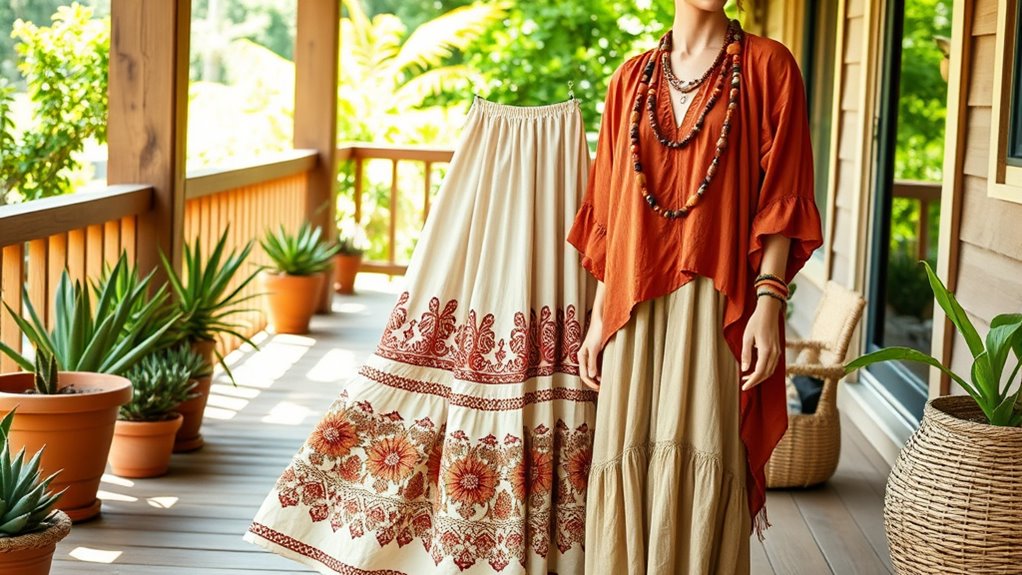
Looking for brands that combine the boho aesthetic with ethical values? You’ll find plenty of options that prioritize transparency and sustainable fabrics. Here are four top choices:
- Reformation — uses organic cotton and recycled materials to craft eco-friendly styles.
- People Tree — champions fair wages and ethical fashion, sharing supply chain transparency.
- Encircled — a B Corp-certified brand focusing on timeless, versatile pieces made with sustainable fabrics.
- Vintage platforms like Depop and Etsy — offer handcrafted, upcycled boho garments that reduce waste and support sustainable fashion.
These brands and platforms help you embrace your boho lifestyle while supporting fair wages, environmentally responsible production, and transparency in every step.
Stay Ahead With Future Trends and Tips for Building a Conscious Wardrobe
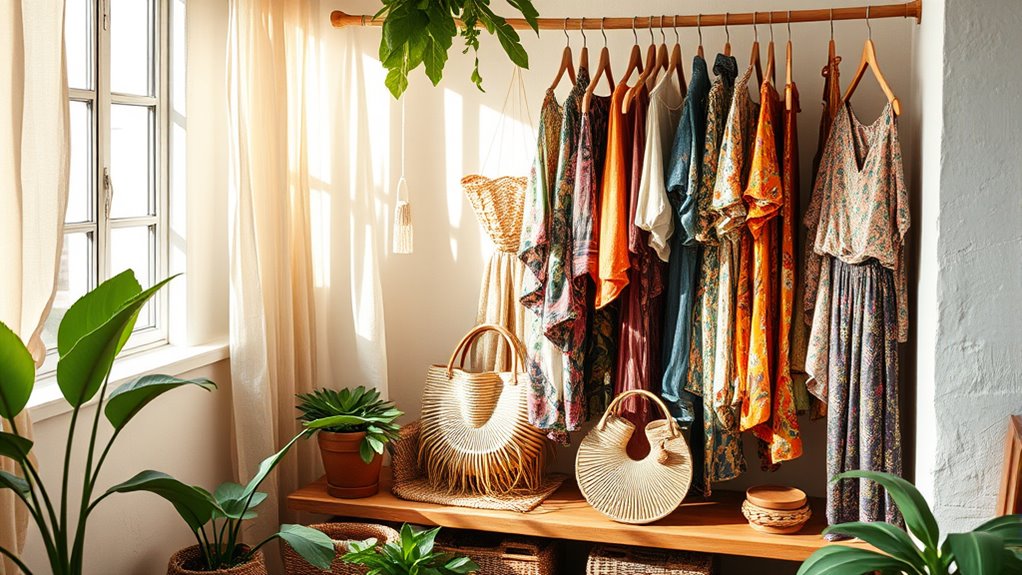
Wondering how to keep your boho wardrobe both stylish and sustainable? Future trends in sustainable fashion focus on eco-friendly fabrics like linen, hemp, and recycled textiles. To build a conscious wardrobe, support ethical brands that prioritize transparency and certifications such as GOTS or Fair Trade. Incorporate vintage and second-hand pieces from platforms like Etsy and Depop to reduce waste and add unique touches. Stay ahead by embracing water-saving dyeing techniques and plant-based dyes, which are revolutionizing eco-friendly fabrics. Use the table below to guide your choices:
| Focus Area | Action | Impact |
|---|---|---|
| Timeless Pieces | Invest in maxi dresses, linen pants | Longevity, less waste |
| Supporting Brands | Choose certified ethical brands | Ethical production, transparency |
| Future Trends | Incorporate recycled fabrics, dyes | Innovation, sustainability |
Frequently Asked Questions
What Is the Most Sustainable and Eco-Friendly Fabric?
When choosing the most sustainable and eco-friendly fabric, you should consider hemp. It grows quickly, needs minimal water, and requires no pesticides, making it incredibly eco-conscious. Unlike other fabrics, hemp has a low environmental footprint and regenerates quickly, helping you reduce your impact. By opting for hemp, you support sustainable practices and lessen the strain on natural resources, making it a smart choice for eco-friendly fashion.
What Is the Most Eco-Friendly Fashion Brand?
You’re curious about the most eco-friendly fashion brand, and the answer depends on your values. Reformation leads with its use of sustainable fabrics like Tencel, hemp, and recycled materials, aiming for carbon neutrality. Patagonia is also a top contender thanks to its strict environmental standards, recycled materials, and transparency. Both brands prioritize reducing environmental impact, so choose based on which values resonate most with your eco-conscious lifestyle.
What Are the Best Boho Brands?
You’re looking for the best boho brands that capture the free-spirited style you love. Brands like Reformation, Spell & The Gypsy, and Amour Vert stand out for their eco-friendly fabrics and ethical practices. Vintage shops such as Etsy and Depop offer unique, upcycled pieces. For timeless styles, check out People Tree and Tulle & Batiste. These brands help you stay stylish while supporting sustainability and conscious fashion choices.
Which Luxury Brands Are the Most Sustainable?
Imagine walking through a lush forest, where every step leaves a gentle footprint—this is how some luxury brands approach sustainability. Stella McCartney leads with innovative biodegradable fabrics, Gucci aims for carbon neutrality, and Khaite emphasizes transparent, eco-friendly materials. Gabriela Hearst and Prada also make strides with recycled textiles and waste conversion. These brands blend opulence with eco-consciousness, allowing you to indulge guilt-free while protecting our planet’s beauty.
Conclusion
By choosing eco-friendly fabrics, supporting transparent brands, and embracing timeless pieces, you gently steer your wardrobe toward a more sustainable future. Every conscious decision, no matter how small, helps nurture the planet’s well-being and champions ethical practices. As you weave these mindful choices into your boho style, you subtly influence the fashion world to follow a kinder, more sustainable path. After all, your wardrobe can be a quiet but powerful force for positive change.




